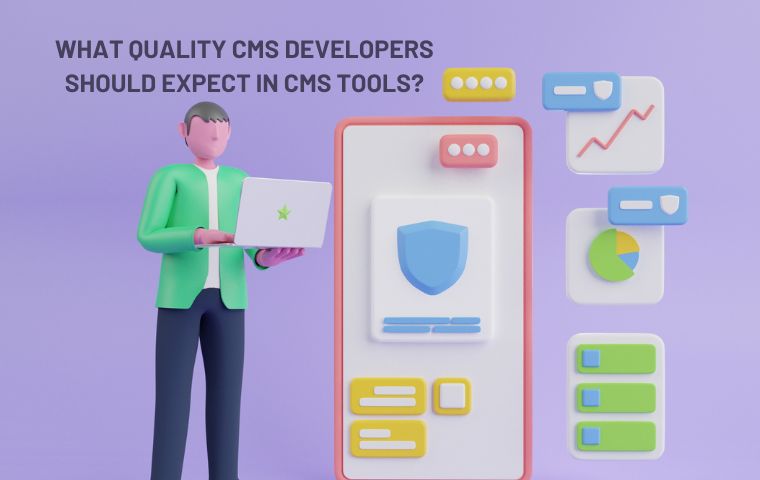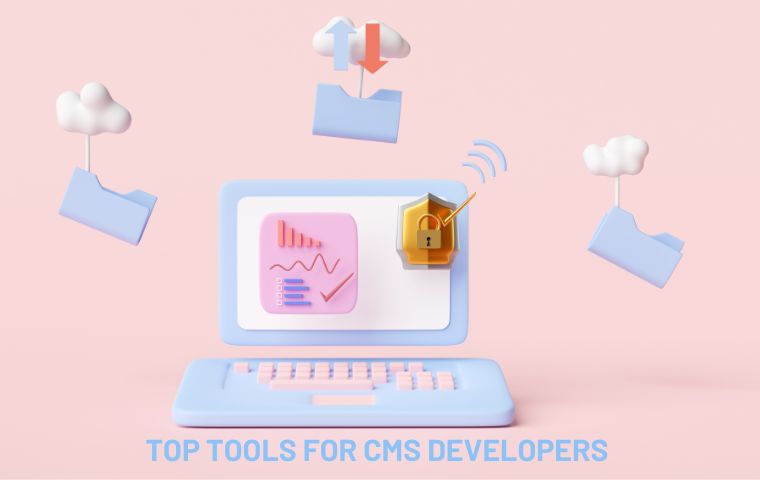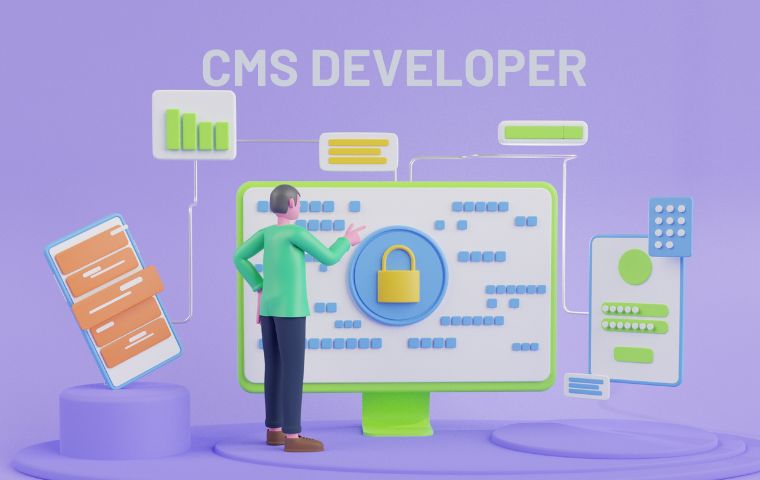TABLE OF CONTENT
Definition and Types of CMS
What quality CMS Developers should expect in CMS tools?
Top tools for CMS Developers
CMS Developer Jobs Description
Conclusion
Definition and Types of CMS
A content management system (CMS) defines a website application to allow programmers and content admin to create, publish, manage, and store all formats of digital content and pages.

How does a CMS work and how is it used?
CMS owns a friendly user interface integrated that allows users with and without technical expertise to easily create, edit and publish web content. All necessary features to manage posts, pages, and other digital content papers are available with CMS. However, in case of advanced technical requirements, you need to involve CMS developers to customize the platform to address tailored experience.
Based on business requirements, there are two typical types of CMS: enterprise content management (ECM) and web content management (WCM). Besides, a CMS is also divided two components including a content management application (CMA) and a content delivery application (CDA).
- The CMA is the front-end service that powers the interface and administration pages for user.
- The CDA component is the back-end component that supports management and performance of the webpage. Most CMS developers’ jobs are to deal with and optimize this component and connect it with the CMA component.
After definition of CMS and how it works, let’s discover the best tools that are trending in the 21st century for CMS developer services.
What quality CMS Developers should expect in CMS tools?

- Efficient indexing, search, and retrieval to index all data for easy access through search functions. Users/ Developers can use this feature to enable users to search by attributes such as publication dates, keywords, or author. The more intuitive and faster this indexing does, the more qualified CMS tool is.
- A quality CMS tool also allows format processing to edit contents and turn scanned paper documents into HTML or PDF documents. Some CMS tools can offer automatic format management to save time and effort for CMS developers.
- Update features that allow editing content even after publication and store revision versions to control changes within files and pages. This feature helps both admins and developers quickly track down and troubleshoot problems when problems occur.
- Publication: These functions allow most people
- Ease of use: Prioritize a graphical user interface, it allows non-technical users to use the CMS software.
- Easy to search for information: CMS platforms provide built-in function, allowing users to search for and achieve a list of items.
- Easy to manage content: Not only is creating content easy, but so is removing content. With a CMS, you can easily to publish content to keep website up to dates.
- Accessible from anywhere. A CMS can be cloud-based or on premises, but users can access content from anywhere with a device that’s connected to the internet.
- Allows multiple users: No matter how you want to creat how many user accounts, a CMS also allows you. Furthermore, it is easy for you to manage publishing permissions.
- Instant content updates: A CMS enables users to manage and update content in real time — without needing to wait for a developer.
- Easy to scale: A CMS makes it easy for businesses to add new web pages as their business grows without the need for a developer.
- Easy to update: You can update not only website content but also features with just a new clicks. However, if you need to add advanced features, you need to IT team to create custom CMS.
Read more:
Top tools for CMS Developers

- Joomla: This is a free and open-source web content management system built on a MVC framework. Joomla is a PHP-based CMS with user-friendly interface which allows user to quickly create caching, RSS feeds, blog posts, search and support for language translation.
- WordPress: As a free and open-source CMS, WordPress is written by PHP language and easily integrate with databases like MySQL. WordPress allows businesses to integrate with a variety of plugins and features free and paid to improve your CMS. This software is highly customizable, with many themes and WordPress plugins available.
- Backdrop CMS: This is a free and open-source CMS that is part of the Drupal project and provides affordable CMS for small- and medium-sized organizations. On its own, Backdrop offers just the most basic web content management features, but it can be extended with the help of the various modules.
- Wix: This CMS offers both free and paid plans. Wix is a CMS platform which provides team collaboration tools, enterprise-grade security, third-party integrations, design templates to customize through code. Wix also provides 24/7 customer support.
- HubSpot CMS: This paid CMS features a drag-and-drop page builder, SEO recommendations and website themes. HubSpot’s free CRM platform is also included in each CMS package, enabling users to keep track of customers and content, all in one place.
- Magnolia: This is an open-source, headless CMS that enables integrations with numerous marketing technologies — including CRM systems, analytics and marketing automation tools. Features include personalization and optimization, and digital asset management.
- Shopify: Famous for CMS for eCommerce, Shopify provides a wide range of features for eCommerce store to engage customers as well as improve sales. This enables businesses to manage online store and easily integrate with third-party systems to manage business in a single platform.
CMS Developer Jobs Description
CMS stands for Content Management System. Developers are in charge of web development using CMS for both back-end and front-end development, which includes creating ubiquitous CMS elements such as WordPress plugins and themes. They are skilled in a variety of programming languages, primarily PHP, HTML5, SASS, CSS3, jQuery, and JavaScript. They are also quite skilled in terms of aesthetics and website front-end ergonomics. They may not be the best designers, but they work effectively with designers to replicate their input using programming talents.

We are looking for a skilled and knowledgeable Content Management System (CMS, for example, WordPress) Developer to join our IT team.
The ideal candidate will be familiar with the back end and front-end programming of our website, comprising new web pages, revisions to existing web pages, theme and plugin maintenance, and so on. The ideal applicant will be able to take complete management of the CMS and create pages from scratch as needed. Developers must also include widgets and APIs into the webpage to create and manage a fully working site. Self-starter who is enthusiastic and passionate about her job and has the capacity to work autonomously under time limitations to achieve recurring and conflicting deadlines, as well as operate cross-functionally in a team-oriented atmosphere such as:
- Working with the digital team, engaging towards web development and aligning with marketing plans to play a significant part in improving the company’s online users’ experience in order to boost inbound leads.
- Create wireframes and collaborate with the design engineer to transform ideas into projects.
- Install required themes and maintain the website lightweight and SEO-friendly.
- Design and construct marketing sales funnels for campaigns and other operations in collaboration with the marketing team.
- Manage files and media.
- Ensure the website’s security and avoid spam via online forms.
- Create online forms and use APIs to connect to the CRM.
- Pop-ups and triggers may be created and managed.
- Use script and CSS minification techniques to help website pages load more quickly.
- When needed, create HTML emails. Keep an eye on SEO optimization across browsers and many common devices.
Conclusion
The CMS developer must be constantly adapting to emerging needs in next year’s market. Keeping a keen eye on these trends will help CMS developer jobs leverage the most powerful tools available, enhancing efficiency, innovation, and the quality of the websites they deliver. And along the way, our AHT Tech CMS developer‘s pillar will always be here to help and support. Stay tuned for another piece of experience passing for CMS developer services, contact us now!



